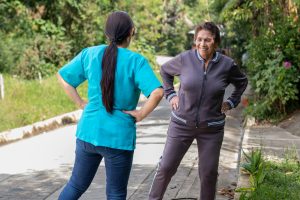Warmer weather is finally here, at least most of the time. The flowers are blooming, the trees are budding, and the grass is getting green. Along with the beauty of spring, comes seasonal allergies for more than 50 million people in the United States.
There’s a common misperception that people from older generations do not experience allergies. While there is evidence that the prevalence of allergy issues has increased over the years, seasonal allergies do not discriminate by age. In fact, adult onset allergies are common. Unfortunately, the condition often remains untreated in aging persons. This makes it essential for caregivers to know the basic facts about allergies in the elderly, as well as what to do about them.
- Know the signs. A runny nose, itchy and watering eyes, congestion, and sneezing are the traditional symptoms associated with allergies. In more severe cases, allergic people may also experience fever, dark circles under the eyes, aches and pains, fatigue, and trouble with sleep. Sinus, ear and upper respiratory infections may develop when initial symptoms are left untreated.
- Be aware of complicating issues. Because doctors are often focused on managing chronic diseases, they may miss the signs of seasonal allergies. It may also be more difficult to treat because of allergy medications interfering with those that manage chronic conditions; traditional antihistamines are typically avoided in the elderly due to side effects. Further, pre-existing heart or lung issues can be complicated and worsened by allergy symptoms.
- Try controlling the environment. There are steps that can reduce allergens and symptoms.
- Watch the weather forecast for pollen counts. Avoid outdoor time and keep windows closed when pollen counts are high.
- When going outdoors, wear sunglasses to keep pollen away from eyes.
- Wash hands, shower and/or change clothes when returning indoors.
- Keep the air conditioning unit serviced and change the HEPA filter regularly. In addition, consider an air purifier.
- Eat foods known to fight inflammation, like apples, greens, and ginger.
- Track triggers and attempt to avoid the things that worsen symptoms. Common culprits are mowing grass and raking leaves.
- Talk to the doctor about preventative treatment, as well as treatment of symptoms. Allergy shots, which are similar to vaccinations, may be a viable option. Natural treatments, such as saline rinses, may also be helpful under a doctor’s guidance.
Knowing more about allergies will help you be better equipped to help your aging loved one cope with the season. Fortunately, most of these tips hold true for allergy sufferers of all ages. We wish you a happy, healthy, sneeze-free spring.






